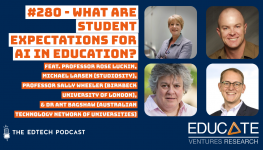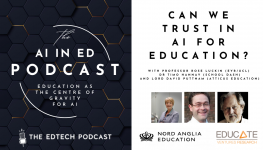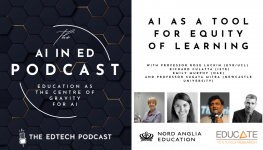2021: An Imperative to Innovate

A guest blog post for The Edtech Podcast, by Katie Boody-Adorno, CEO of LEANLAB Education | Twitter: @LEANLABed
In education, we’ve been standing at a crossroads for the last 10 months. The decisions we make now will dramatically shift the education sector–perhaps permanently. I know you know this. Like me, you’ve been ruminating on this intuition. For those of us working day-to-day in this sector, the weight of these decisions is real. Palpable. The tenuous footing we stood on a year ago has become even more unsteady; our entire sector is undeniably in flux. Is this what disruption feels like?
I’ve felt this with my five-year-old nephew and my sister-in-law. He’s a kindergartner at a Kansas City charter school and she’s a working mom. He accesses the only public school he’s ever known through a screen, from a dining room chair with his Abuela’s steady support.
Our family dinner conversations have shifted. We talk about learning management systems instead of playground gossip. Everyone wants to know, “why is it so hard to get all these apps and platforms to play nice together? My sister-in-law talks excitedly about her ideas for product modifications to her son’s learning management system. She has no background in technology development, but still, she envisions improvements. She longs for more streamlined integrations, more information about how to customize and advance her son’s love for math, and guidance on how to nurture the areas where he needs more support (reading).
My conversations with teachers have shifted. During one-off Saturday mornings or stolen lunch breaks, teachers tell me earnestly, that for some children, the virtual environment is working better! Working remotely, teachers have better systems to differentiate instruction and provide more personalized support. However, they also have students who are struggling; students who have fallen off the radar, are rarely logging on, or have challenging home learning environments.
“I find that I’m actually a more successful educator this year. I’m more focused, can give more targeted attention,” one teacher says, while also noting, “but if we do go back to business as usual, and the status quo… I’m not sure that I can.”
I make time to listen to teachers’ first-hand experiences, but I also observe their actions. Teacher unions are understandably advocating for delayed returns to school until they’re satisfied their environments are safe. They want fully-executed vaccination and testing plans, resources for proper social distancing and sanitization measures, revised distance learning plans, and enough substitutes on hand for support (CTU reopening demands).
The prolonged delays to returning full-force to the classroom may seem especially protracted, but I suspect they also speak to a deeper longing from our collective unconscious… a desire for a paradigm shift that would affect the entire industry, then ripple outward to all professions… a declaration that we’re not going back… not back to the way things were… we can’t.
Am I advocating for a shift to an edtech-driven universe, the demise of brick-and-mortar classrooms? No. Our research from the last year illuminates persistent inequities and early evidence suggests learning gaps have been exacerbated by this pandemic (PACE). There’s no question that children need safe, nurturing, developmentally appropriate places to socialize and learn, but now we need to grapple with what a more dynamic, customized and hybrid environment should look like for the long-term.
“We’re not going back… not back to the way things were… we can’t.
And yet here we are–in a new calendar year, either staring down the barrel or standing on the precipice. Do we return to slow, incremental change–to structures and models that have historically done little to solve for the persistent inequities, painfully illuminated by this pandemic? Or do we acknowledge where we’ve been wrong, commit to making a change, and begin placing new bets?
What we’re musing
Can accountability be shifted away from classrooms, students and teachers, and onto systems, leaders and edtech tools?
We aren’t holding doctors and nurses single-handedly accountable for the reduction in spread of Covid-19. Instead, we are equipping them with vetted vaccines. After months of research, clinical trials and testing to ensure the vaccines were sound, we then understood under what conditions the vaccines were most effective (they have temperature requirements, expiration dates, etc.). It was then that elected leaders were responsible for leading distribution.
So, I wonder, can we transfer this idea to the education sector?
What would a world look like if we had a structured system to vet and test education tools, ensuring they were based on foundational learning science and were easy to use across a variety of learning contexts (grandma’s dining room, the classroom, the community center)?
What if we had a clear, evidence-based guide to understand what conditions these solutions achieve their intended outcomes?
Could we then provide system leaders with the information they need to buy best-fit solutions, while equipping educators with implementation roadmaps that tell them how to modify instruction toward optimal outcomes (i.e., “for best results…”)?
That’s what I want to test.
I envision a world where educators spend less time on arduous content creation. They are no longer beholden to unimaginative, unproven and clunky tools, or constrained by the heaviness of standardized tests. Instead, they are freed up to invest their time on building meaningful relationships with students and their families, developing more customized and targeted interventions and designing experiences that bring learning to life.
In this world, rather than relying on overly cumbersome and high-stakes assessments, teachers leverage assessments to inspire agile, data-driven student interventions. The accountability then, shifts. Imagine a world where we hold our state elected and appointed officials and school system leadership accountable to the expedient and equitable distribution of evidence-based, trialed solutions.
Can this be the year where we begin trying something different? We’ve loosened restrictions on standardized testing for the last year. Why not re-envision education all-together?
Conclusion
The days ahead will not be easy. I’m reminded of the Maya Angelou quote, “I did then what I knew how to do. Now that I know better, I do better.” We have arrived at this moment. We now know better.
Am I suggesting that edtech is a panacea, a one-shot vaccine? No. But I am suggesting that we are in a new age of rapidly evolving technology. We owe it to our students and to future generations to begin developing new tools, new methods, new accountability practices and more dynamic learning environments to reach learners wherever they might be. Now, let’s do more, better.



